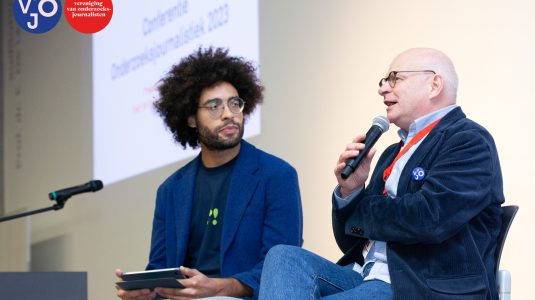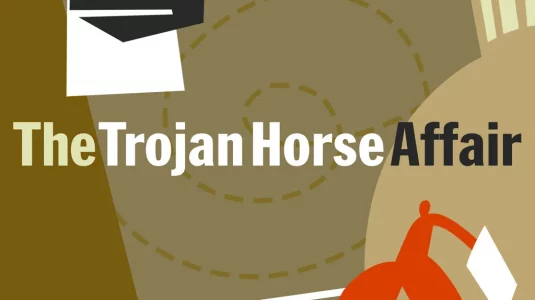VVOJ Conferentie 2004
Titel: The hard, hard stories
Workshop: Eerste keynote speech
Sprekers: Steve Bradshaw (BBC Panorama)
Datum en tijd: Vrijdag 19 november, 09.50 – 10.25 uur
Bradshaw: I’ve got just one thing to say about mistakes. My limited experience with talking to groups of investigative journalists is that they immediately start investigating each other. So I will confess immediately that I am myself under investigation by the BBC for my New York restaurant-bills. And the position is: I have agreed to pay the alcohol, the coffee and the friandises. But the crème brulées are under negotiation.
I’m going read from the notes I have here and will be playing some clips.
We at the BBC have been living this year in what the Chinese call interesting times. This being of course a curse. Some of the most important issues did not hit the headlines. For example: two important developments that may have resonance for investigative journalists elsewhere in Europe. One is the 1998 human rights act. And its guarantee of the right of privacy. Moderated of course by the right of free speech. This is something relatively new in British law and has lead to concerns about who we can point the camera at and when. But we don’t really know the answers yet.
Another issue is the British Government 2000 terrorism act, which obliges us to disclose any knowledge of intended acts of terrorism or the identity of terrorists. No geographical limit. Common sense perhaps, but the concern here is what this means when we are operating abroad. For example investigating armoured groups that some may call subversive nationalists, but to others they may be terrorists. What we do, we don’t really know.
Then there was the more widely publicised issue to which you have referred, when the BBC itself became the story. Public inquiry lead by Lord Hutton earlier this year into the circumstances surrounding the death of the much respected government weapons-of-mass-destruction scientist Dr. David Kelly. The BBC, I know, wants to move on from this, but I’ll say a few words anyway.
There was a particular focus in the Hutton report and elsewhere on a live early-morning news broadcast, just one, by our former BBC-colleague Andrew Gilligan. This was followed by a chain of events that culminated in the suicide of Dr. Kelly, Gilligan’s source. In his report Gilligan had suggested that government was making claims about Saddams supposed weapons of mass-destruction which, the government knew, were not entirely supported by facts.
This claim in the broadcast was not entirely supported by established facts itself. Established facts. And Gilligan later apologised for that. The BBC management initially stood by the substance of the report, only to apologise unreservedly after the publication of the Hutton report, which found the BBC had not on this occasion lived up to the best journalistic practice. The BBC however did not accept all of Huttons conclusions in full. After the report, the BBC director general and chairman both resigned under what I can only call acrimonious circumstances.
Since then, the BBC has commissioned its own report, the Neal report, and undertaken some new initiatives on training and to clarify the best practice for sourcing of stories, an issue which the Hutton report raised in some detail. Where I should say, some of these changes to BBC-practice were not simply as a result of the Gilligan-affair. The inquiry went much wider.
But the new rules state, or restate, the common prescription that at least two background or off-the-record sources are preferable or ideal to substantiate stories in which there is no prima faci evidence. However a single source story may be justifiable in some circumstances. The rule is that editors expect you to name the source. If the source says they don’t want to be named even to an editor, obviously you have that right. But of course the editor has the right not to run the story. All this seems to me really just common sense.
Did this affair represent a full-blooded crisis in BBC-journalism as has been made out and as you may have heard? I don’t think it did. We should remember, the headlines saying ‘BBC journalism in crisis’ do not necessarily mean BBC journalism ís in crisis. They may mean someone would like there to be that headline and not another.
The program for which I currently work is called Panorama and has been on the air for over 50 years. It’s a one subject filmed documentary report once a week. Some is frontline reporting; we have just done a long report into investigating genocide in Darfur. Some is investigative journalism, sometimes programs weighing key policy issues. My editor incidentely doesn’t like the term investigative journalism since it implies this is some kind of specialisation and the rest of journalism doesn’t have to bother investigating or asking questions.
One recent edition of Panorama, a special edition of over an hour and a half, tried simply to give an accurate and unbiased account of the events that lead up to the Hutton report. A core value of the program is its independence, and as you can see from this clip we’re going to show, I hope, this includes independence from its own bosses in the news division who did not see this film and this part of it in particular in advance to transmission.
Geluid van filmpje:
“…. Indeed the BBC’s director of news Richard Sandburg had for some time been concerned about Gilligan’s lack of care in choosing some of his words. He’d warned Gilligan that if he didn’t control this, it was going to undermine him as a reporter. Tonight Andrew Gilligan accepted he had been rebuked, but denied it amounted to being holed over the coals.
Trust in the BBC is an inheritance founded on the accuracy of its news reporting. Yet the director general and its senior executives bet the farm on a shaky foundation. They were drafting a robust letter of reply to Downing Street with their full weight behind the reporter without a full investigation, knowing he had used loose language in the past.”
Sorry about the quality of the sound, but I hope the part you did capture is where we remark the director general and senior management bet the farm on a shaky foundation.
So how does the BBC come to both nourish and protect a program that is prepared to criticise its own management? When the program began, it was a magazine show, more than one item or segment as the Americans call it in an edition. The first program was a notorious debacle, or mess. The tape-recorder ran backwards and the program was taken off the air. However the BBC decided it would bet the farm on this shaky foundation and it went on.
Its early magazine-format was ultimately dropped. To many in depth news-bulletins where now doing pretty much the same job. But that’s a good thing. Because that meant that serious money could be devoted to one subject. And it’s this, which has allowed teams of Panorama-journalists to devote many months, sometimes a year or more to single issue-investigations.
Which crucially can withstand scrutiny. It’s for that reason that… the films would normally go through something like 30, 40 drafts, some have gone through a 100 substantial drafts and rewrites and just that is what in a Gilligan situation, in a live broadcast you can’t do. So it’s a luxury. But that’s what withstanding scrutiny means for us.
There are other investigative programs on the BBC. Recent one into undercover investigation into racism among police-recruits. But I think what has distinguished Panorama is that it has treated the viewer as a citizen rather than as a consumer. Treated the viewer as a citizen, and has consistently tried to investigate how power works in Britain and the rest of the world. How power works, political, economic and social power and including lobby organisations and other groups as well as governments. How power works and when it’s abused.
A couple of recent examples of how we tried to do that and I’ve been involved in, which I think do suggest how we can try to engage with power groups and elites without falling into the trap of using our skills to point the finger just at a few bad rotten apples. Because that can seem sexy and macho. These are two projects that didn’t question anybody’s sincerity or motives, but did investigate how power is used and in at least one case some would say abused.
First, before the invasion of Iraq, Panorama had made a number of films looking at the case against Saddam. Did he have weapons of mass destruction? So we made another program looking at, scrutinising the case against the war. We were able to make this film without any intervention whatsoever.
Whether politically from outside the BBC, or editorially from within the BBC. We simply filmed with 7 people you would not expect to be making the case against the war. Including the commander of British ground forces in the ’91 war and also former CIA-agent Robert Behr, who had once been investigated by the FBI for attempting to assassinate Saddam. As you can see from these two clips I’ve put together from the program, our research drew attention of one particular group of influential American thinkers. Here’s a couple of clips of that.
Geluid van een filmpje:
To examine the case against Saddam, tonight we assess the case against going to war Saddam.
-My troops lead the armoured attack into Iraq. At the moment I don’t believe the case is being made for another war against Iraq.
-I talked to people in the CIA and they’re worried about the order in the region.
And privately people in the CIA said to you?
-That war is a bad idea. It’s going to cause more terrorism. The cooperation of the local governments is going to end.
Behr believes war with Saddam is being sold to President Bush by right wing hawks, so cold neo-conservatives, who started promoting war against Iraq long before the 11. September last year. Four years ago, a group calling themselves “Project for the New American Century” wrote to President Clinton urging the removal of Saddam Hussein’s regime, urging for military action to disarm him and to protect our vital interests in the Golf including oil. Most of those who signed it now serve the Bush administration. Including Defence Secretary Donald Rumsfeld.
– Today they have the chance to do something about it. And they want to prove themselves right. They say we were write in the nineties and we’re going to show you today. Just watch, watch while we set the place on fire.”
You know what is happening to the dissidents in the CIA now. We followed this up and we spent the war filming with these men and women, loosely called the neo-conservatives. This was all quite new at the time, it seems quite old now. It did seem new at the time. So we made a film in the language of an access-film rather than a traditional investigation. But I hope it was still revelatory about political and military power. Here’s a couple of clips on that.
Geluid van filmpje:
They call themselves neo conservatives, right wing thinkers whose dreams of a new American century have become George Bush’s foreign policy.
– The President of the United States on issue after issue has reflected the thinking of neo conservatives.
What’s new about the neo-cons thinking: They believe America’s military might should promote America’s ideals.
– American power should be used not just in the defence of American interest but for the promotion of American principles.
Throughout the war we were with the neo-cons in Washington, going behind the scenes. Finding out what makes them tick.
-I’m a student of American values. I wrote a book about American values and I know the struggle against evil is going to go on forever.
And what do the neo-cons have in store for us now?
– We are going to have to bring down a series of regimes who are this sponsors of a network of various terrorist organisations. Syria, Saudi Arabia, Iran, North Korea and there’s Libya.
Tonight: will America’s super hawks drag us into more wars against their enemies?
Okay, this second example I wanted to show: a film that investigates powers is perhaps a bit harder or more hard-edged. We decided to make a film investigating on four continents claims that Pope Jean-Paul the Second’s passionate campaign against abortion and contraception is damaging the lives of many women in developing countries. Here’s the tape of the clip on that.
Geluid van filmpje:
Imagine the land in which ideal unity is the reality. And ideal sex. Simultaneous climax between a loving couple. And is this land, all couples are married. No barriers to perfect self-giving, no barriers to childbirth, no condoms, IUD’s or pills. Abortion’s illegal too. This land does not exist. But these ideals do in the work and thought of Karl Woytila, now Pope John Paul the Second. This is a film about what happens when those ideals clash with reality.
It is the story of two schoolgirls in Latin-America raped by their father and given no choice but to have his children. It is the story of catholic nuns in Africa telling people with Aids not to use condoms because they have holes in them. And in Asia it’s the story of a mother of nine who don’t use contraception. The Catholic Church says it’s wrong. All lives affected by the beliefs of John Paul the Second who this week in the holy city of Rome celebrates 25 years as leader of the world’s billion Catholics. Although frail he is still leading a campaign against contraception and abortion that is inspired by gratitude and hostility. Tonight we investigate how the man who idealised women came to be accused of promoting beliefs that can ruin lives.
Sorry about the sound, I recorded these myself.
Now we had no idea when we set out on this project what we would find. But we reporters we did sort of go into the forest and shake the trees. What happened was that while in Kenya we discovered that some leading Catholics were not only publicly burning condoms, this in the middle of an Aids-epidemic, but were claiming they don’t work against Aids. “Because”, they said, “Latex, all latex has tiny holes in it which allow the virus to pass through”. We found this claim crucially being repeated at village level amongst ordinary people and we also found echoes in the Philippines and Nicaragua. I have to say that when we recorded this, we didn’t realise this was a worldwide thing. In effect we stumbled across worldwide efforts to convince people that advice from the World Health Authority en the UN-Aids’s advisory that condoms protect against Aids, was wrong. What’s more, to our surprise, we found this was endorsed by the Vatican.
Geluid van filmpje:
Catholic bishops in Kenya produced this pamphlet which claims that latex rubber from which condoms are made does have pores through which viral-sized particals can squeeze through during intercourse. We read this to the World Health Organisation. They told us that it is simply not true.
– This is scientific nonsense, isn’t it?
That is scientific nonsense?
But it is true when they are defective….
– It doesn’t say anything here about defective condoms. It says the latex rubber from which condoms are made has pores…
– But I need proof…
It says Latex rubber. It says that viruses can pass through Latex rubber. It’s nonsense.
– But I need scientific proof..
Archbishop, with the greatest respect, what I’m suggesting is that you’re peddling superstition..
– No superstition. We need proof from those people who are being right in this matter.
We heard the story from Catholics in two other continents. From the head of the Pro-Life clinics in the middle of the city.
– What is wrong with condoms? You see condoms they are made of rubber. So even the Aids-virus can pass through that pores of the condoms.
And we’d heard the same claim from the cardinal in Nicaragua.
-While studying genetics, we were told that Aids can be transmitted through the doctor’s surgical glove, which is less porous than a condom.
Is it the position of the Vatican that the virus, the HIV-virus can pass through the condom?
-Yes, yes, because this is something the scientific community accepts.
That was from the same film: “Sex in the Holy City”. It was a later part of the film. Our evidence there lead to a worldwide outcry. It also led to a number of angry and hostile emails, one expressing the wish that my father had used a condom. And another saying: “You’ll know we are right the moment after you breathe your last breath. We also had formal complaints to the BBC about the whole program. We had to defend the film, as one always expects, line by line. The Vatican who has nothing to do with those emails, the Vatican in the mean time responded by publishing a 22 page document that’s called “Safe Sex versus Family Values”, you can get it on the web. A 22-page document with 87 footnotes quoting many scientific papers saying they were right in attacking our program. Standing by its claims about holes in condoms.
We responded by spending several months investigating these sources. We talked to the scientist who had written the papers. We looked at the footnotes of the footnotes. We satisfied ourselves that their work had been misquoted, miscited or was simply out of date. We didn’t just take the World Health Organisation’s word for it that the Vatican was wrong. We then made a further film about what we’d found. Essentially it was a film about the Vatican’s complaint against our original investigation.
I should say this was an expensive project, but we felt it was a public service not just for Britain but for the rest of the world. And indeed we made our film into a radio-documentary so it would reach as wide a worldwide audience as possible. We did not simply report claim and counter-claim as did say much of the media over this Swift Boats and John Kerry-story. We felt we had to call the shots and state it was right because it was a technical subject. But the problem of course, you know, is that this is expensive in travel and particularly manpower. And it does take a team with critical mass like Panorama’s to be able to even contemplate doing it. Even then, only once and a while. Anyway, what we found was that the US government itself had privately had doubts about condoms and had spent several years, successfully in the end, compiling a report that put its own doubts to rest. And so our film confirmed our original story. So here’s a couple of clips from that second film.
Geluid van filmpje:
We’re in New Mexico to meet Dave Michael whose work on whether condoms leak is widely considered the best and the latest. Cardinal Trujillo quotes one of his papers to make his case. Dr. Michael wishes he hadn’t.
– What do you make of how Cardinal Trujillo used your work?
I think that it’s misleading. He didn’t pay attention to the paper. He took a number out of it and basically misused it.
Michael was a US government scientist when condoms were first being promoted as a way of preventing Aids. The story that is not being told is that the US government once shared the same theories as Cardinal Trujillo does.
– One day our Centre director came into the office of a colleague of mine and I was there. And he asked the question: Can condoms stop viruses? And we didn’t know. It was clear that we needed to do some quick experiments to find out where truth lies.
-In a report we wrote that day that from the laboratory and from clinical studies, the data are consistent there are no holes in condoms that present a risk of infection.
No risk of infection at all?
– Not that is significant. Theoretically of course, but not in actual practice. No one should not use a condom because they think it’s going to leak, I don’t care whether they are in the United States or in Africa. They should be using condoms with confidence. That if they use them correctly, they’ll prevent HIV-infection. For the Church to not support the use of condoms to prevent infections is very detrimental to our controlling the epidemic.
Investigative films about developing country-issues are not supposed to get big audiences. But we were told that this got the second largest audience of Panorama’s last series. This was nothing to do with the rather provocative title: “Can condoms kill?”, it had all to do with the fact that we also found it necessary to film in the Rio Carnival and in a place called Cherry’s Ranch in Nevada, where they all know about condoms. We kept our filming at these locations to a minimum and got out of there real fast! I should say the Vatican also claimed that pro-abstinence campaigns work better than pro-condom-campaigns and here we did say they had some interesting but not conclusive evidence.
Just in case this seems not very hard-edged I’d like to show you another clip of a recent Panorama.
After first obtaining evidence of malpractice, as BBC rules require, we set up a dummy company called New London Ventures to investigate the activities of so-called agents who claimed they could swing the votes of Olympic Committee members towards particular cities. This involved extensive undercover filming.
Geluid van filmpje:
New London Ventures was making its last journey. Mister Smirnoff had refused to meet with us but Goran Takash said he could arrange a meeting with another IOC-member in the Bulgarian capital Sofia. Would we get crucial evidence that agents can still help to deliver IOC votes? Would an IOC-member really agree to meet New London Ventures?
“Hello?”
“Is that Goran?”
“Yes.”
Goran wanted to meet for dinner.
“You’ll meet with Mr. Sladkov on the last floor of the Panorama restaurant.”
“In the Panorama restaurant?”
“Panorama restaurant, it’s 19 floors.”
Was this Goran’s idea of a joke? Had he rumbled us? We agreed to meet in the morning. The next morning the Bulgarian Ivan Sladkov did arrive. Driven in an Olympic Jeep. He’s an important man. Not only is he an IOC-member, but he’s the president of the Bulgarian Olympic Committee. He is a professor at Kiev University. He’s been a government Minister. The head of Bulgarian TV. He’s the son-in-law of the ousted communist dictator and surely he should not be attending this meeting.
What we tried to do then, is investigative journalism as opposed to consumer journalism, and particularly as opposed to what I think of as the opposite of investigative journalism: What I’ve come to think of post-modern journalism. When I use the phrase slightly tongue in cheek but post-modern journalism is the most potent rival to investigative journalism and is often in danger of displacing it. By post-modern journalism I mean any activity whose prime motive is to give the appearance of doing journalism rather than actually doing it. Anything which contributes to what the British film critic Nigel Andrews ones memorably called: “The sinister fire-storm of second-hand realities”, which constitutes the post-modern world. I’m thinking of the dangers inherent in for example loosely researched and over-dramatised documentaries. Too much reliance on lobby briefings and off-the-record gossip. Reporting parties and NGO-briefings or other parties and reports as virtual fact. And I’m thinking of undercover filming for the sake of entertainment rather than revelation. True investigative journalism can be, to misquote Ezra Pound, the true disinfectant for post-modern journalism.
Now, I use the phrase in self-parody. You know we Brits have much taste for grandiose self… grandiose French-sounding theories. But I do think it’s useful in reminding ourselves what investigative journalism is. And I think it highlights another issue that should be of current concern to investigative journalists.
Post-modernism I take to be in part a kind of political relativism, in other words, assuming that the liberal rational enlightenment project of the last three centuries is just another cultural artefact. Post-modernism does not assume we are progressing on a straight line towards a better future. In this sense, post-modernism has something in common with some kinds of fundamentalism. It shrugs its shoulders at the notion of progress.
But investigative journalism cannot do this. We want to have an impact. Of course we want to hold a mirror up to reality while we walk along the muddy streets, to confuse I think Shakespeare with Stendhal. And having an impact may simply mean cleaning the mirror and making sure some people can look at it. Clarifying debate and discovering the truth, so people can make their own minds up. But we also want to have an impact because we believe, as democrats should do, that power should be exercised rationally and for the benefit of people in whose name it is wielded. Having an impact may mean contributing to changes in legislation, as a series of three Panorama’s investigating the drug “Seroxet” recently helped to do.
We should never of course stray as investigative journalists into a cynicism that uphold secular values over faith values in private or religious matters. But I think we are living increasingly in an age in which commonly held enlightenment values, 17th century enlightenment values are under threat in the political sphere for many competing voices. That’s one reason why we need real investigative journalism more than ever. It may not always be sexy, may not even much look like investigative journalism at all, but is does hold power to account, and hold it to cold rational account.
Christiane Armanpour once said we must continue to do the hard, hard stories. Well, these are the hard, hard stories. At best they are the stories that are hard to tell because someone somewhere doesn’t want them told. Or they want them told in a particular way and now have the news-management techniques to help them. We need these hard, hard stories more than ever. The rest, it is often been said, is public relations or maybe now post-modern journalism.
I’d just like to finish for I got four minutes left, with a clip from a film, which is never been broadcast. It’s from the birthday party video, which Panorama recently compiled, for it’s own fiftieth birthday party. It includes a doorstep interview with a man associated to the Omagh-bombing in Northern Ireland. My own less dramatic confrontation with the Prime Minister’s press spokesman who subsequently accused us of literally, literally trying to pick a fight with him. And also a remarkable scoop from Italy, though I suggest you watch out for the date of that.
Geluid van filmpje:
Panorama’s ambition has been to irritate. If the camera edges too close, a royal detective places himself between it and the queen.
“I was crying out for help, but giving the wrong signals. And people were using my bulimia as a coat on a hanger. They decided that was the problem. Diana was unstable.”
Mister Prime Minister? I’d like to speak to you. The BBC from Panorama, I want to ask you some questions about…
Caught in the bush where there is a 24-hour curfew. “Mr. Ridley, Andy Davies Panorama” “Andy Davies!” “That’s right. I wanted to ask you for how long were you paid off by Brian Reynolds?” “How long I was been paid off by Brian Reynolds? That’s a silly odd question.”
“Hello” “Is Mr. X in? “No, he’s not here.” “No”.
“Tell a pack off lies..”
-You set out as you say to have very few spending commitments and not to increase tax rates. Hang on a minute.. You said that we couldn’t. You said that we have to stick to the government spending limits. As if that was some sort of criticism. “I didn’t say that” Labour chose to do that!
“Last time Iraq denied that it had any of these weapons of mass-destruction, made all sorts of excuses and then after the war it was discovered that you did have all these programs. So this time, people feel that there’s still a lack of credibility.”
“It’s coming back…
They trapped them in the narrow streets in the central Brussels, when they charged and attacked them.”
“The victims all of them Tutsi’s have gone to the church in search of sanctuary. Instead the house of God became a killing ground.”
“Some people would say it’s still life. You’re still alive and surely that must be better than being dead.” Eh eh..” I don’t know what the other word is. “I want dead.
Never give up hope unless you are, unless you are just on the last little drop of life you have in you. Never give up.”
“The information clearly says that Seroxet is not addictive and it is not.” “It’s quite clear that the phrase ‘Seroxet is not addictive’ is poorly understood”.
I am John Ware, from the BBC Panorama program. “Hello John”.
“I’ve come a long way but I’ve come because I want to put the seriousness of the allegations too.”
“Lord Arthur when are you going to explain the Anglia shares affair. Are you going to explain why you bought the shares for your friend Bruce Sahib? We did he buy the shares? Why couldn’t he buy his own shares.”
It’s reporters where heartless bastards but at least Panorama’s viewers have a heart.
“Now Steve and Lynn feel they can no longer afford to keep their dog. It’s a lovely dog. He is a pup. He’s a real pet. It takes nothing because he does eat the scraps. But there is no scraps.” After this film viewers pledged a 1000 pounds to the dog.
And finally in case you missed it: Panorama’s most famous scoop: “Here, in the Ticino on the borders of Switzerland and Italy, the passed winter, one of the mildest in living memory, has resulted in an exceptionally heavy spaghetti crop. Spaghetti cultivation here in Switzerland is not of course carried out on anything like the tremendous scale of the Italian industry. For those who love this dish, there is nothing like real home grown spaghetti.”
And there contented, we will close our window on the world for this week. We shall meet again next Monday, we hope you’ve enjoyed everything you have seen and heard this evening. So until we do meet again: Goodnight.”
“A program on the telly, I’m not talking about Hill Street Blues or Magnum, this was Panorama!”
Thanks, I don’t know why, but in his entire book tour on both sides of the Atlantic, Panorama was the only program with whom Bill Clinton lost its temper.
Thank you very much!








